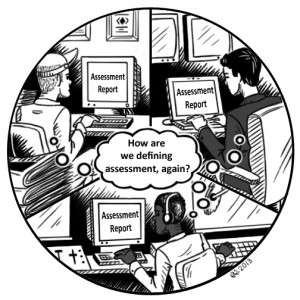By Kay L. Colley
Texas Wesleyan University

Assessment: Just the mere mention of the word can send chills up and down the spine of any new or seasoned student media adviser. Whispered in hushed tones or thrown around as an expletive, this 10-letter word connotes educational balderdash, busywork and just plain wrong-headedness to many in the ranks of college media. But much like student media advisers are misunderstood by administrators, assessment is misunderstood by many student media advisers.
According to the National Academy for Academic Leadership, assessment is a process that describes the current situation of a person, program or unit providing evidence of this analysis. Assessment involves goals or outcomes, processes and inputs. Some assessment methods can include surveys, focus groups, portfolios and direct observation with multiple assessment methods being the preferred way to demonstrate meeting goals or outcomes. Continue reading “Assessment: More than just a dirty word”